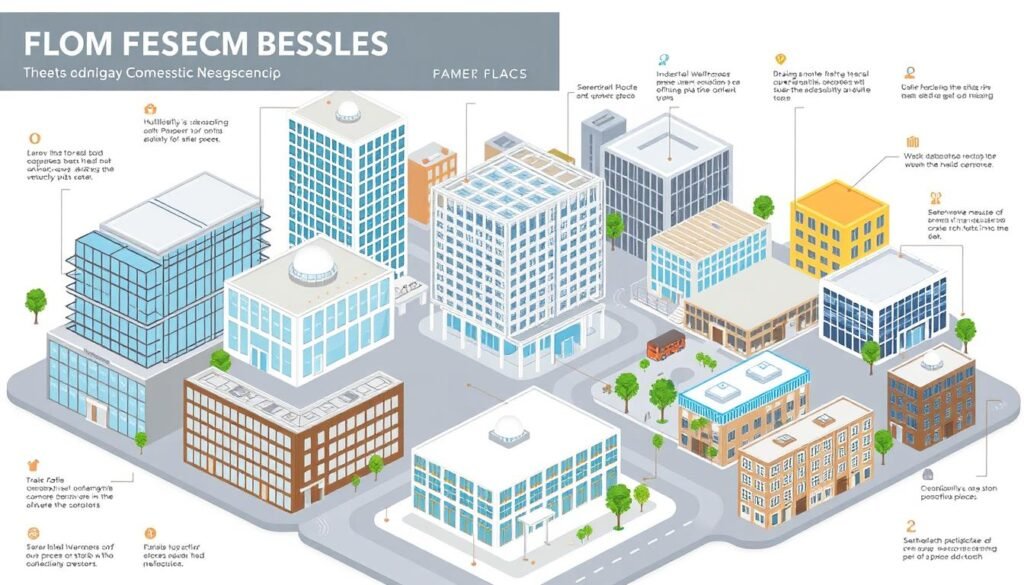Did you know commercial real estate has beaten the S&P 500 by over 50% in the last ten years? This shows how valuable this investment can be. In this guide, we’ll look at why commercial real estate is a great investment. We’ll also give you tips to succeed in this market.
Are you thinking about investing in office buildings, retail spaces, or industrial properties? We’ll cover the benefits of each. You’ll learn how to find the best deals to increase your profits. Commercial real estate can give you steady income and grow in value over time.
Key Takeaways
- Commercial real estate investments have outperformed the S&P 500 by over 50% in the past decade.
- Investing in commercial real estate can provide steady income streams and long-term appreciation potential.
- Understanding the different commercial real estate property types, such as office buildings, retail spaces, and industrial properties, is crucial for making informed investment decisions.
- Navigating the commercial leasing landscape and working with experienced brokers can help you identify the most promising investment opportunities.
- Developing a comprehensive commercial real estate investment strategy, including financing options and risk management considerations, is essential for success.
The Benefits of Investing in Commercial Real Estate
Investing in commercial real estate offers many advantages. It’s a great way to build wealth over time. You can get steady income and see property values grow.
Steady Income Streams
One big plus of commercial real estate is the steady rental income. Unlike homes, commercial properties often have long-term leases. This means more stable cash flow.
This income helps cover the costs of owning and keeping the property. It’s a good choice for those wanting a reliable income.
Long-Term Appreciation Potential
Commercial real estate also grows in value over time. As more people move and the economy grows, so does demand. This drives up property values.
Smart investors hold onto their properties to see big gains. This makes commercial real estate a smart addition to your portfolio.
By adding commercial real estate investing to your mix, you can enjoy these benefits. It’s a step towards a more secure financial future. Whether you’re after steady investment properties or long-term growth, commercial real estate is worth considering.
“Investing in commercial real estate can be a powerful way to build wealth and create a more diversified investment portfolio.”
As you learn about commercial property management, it’s key to know the different types of commercial real estate. Next, we’ll look at the various categories and their unique features.
Understanding Commercial Real Estate Types
Investing in commercial real estate means knowing the different types of properties. Each type, like office buildings, retail spaces, and industrial properties, has its own benefits and challenges. Knowing about these can help us choose the right property for our goals and how much risk we can take.
Office Buildings
Office buildings are a favorite among investors. They offer professional spaces and modern amenities. When looking at office buildings, think about their location, the types of tenants, lease terms, and how much they might increase in value over time. Good locations can lead to steady income and growth in value.
Retail Spaces
Retail spaces, like malls and single stores, are another good option. They make money from people walking by and spending money. Their success depends on the economy and what people want to buy. Successful retail spots have lots of people walking by, strong main tenants, and can change with the times.
Industrial Properties
Industrial properties, like warehouses and factories, are also important. They serve businesses that make, store, and move goods. Important things to consider are how easy it is to get to, the setup, and long-term leases with reliable tenants. These properties can provide steady income and grow in value, especially where there’s not much supply and lots of demand.
By understanding the unique aspects of each commercial real estate type, investors can make better choices. This helps match the right property with their investment goals and how much risk they can handle.

Commercial real estate
Commercial real estate is a key investment area, known for its potential and variety. It includes many types of properties, each with its own benefits and challenges. Knowing these details is vital for investors looking for steady income or developers aiming for growth.
This sector includes everything from office buildings and retail spaces to warehouses and apartment complexes. Each type has its own set of issues and chances, needing careful thought on location, tenants, and market trends. By understanding these aspects, smart investors can spot good opportunities and handle the market’s complexities.
Exploring the Commercial Real Estate Landscape
The commercial real estate market is complex, offering many investment choices. It ranges from commercial leasing to investment properties, allowing for diverse portfolios. This variety lets investors take advantage of each property’s unique features.
| Property Type | Key Considerations | Potential Returns |
|---|---|---|
| Office Buildings | Tenant quality, lease terms, market demand | Steady rental income, potential for capital appreciation |
| Retail Spaces | Foot traffic, tenant mix, location | Percentage-based rents, high-value anchor tenants |
| Industrial Properties | Logistics, accessibility, specialized infrastructure | Stable long-term leases, low maintenance costs |
By grasping the specifics of each commercial real estate segment, investors can make better choices. This knowledge helps them seize the market’s unique chances.
“The key to successful commercial real estate investment is to understand the unique characteristics of each property type and how they align with your investment goals and risk tolerance.”
Commercial Leasing: Navigating the Landscape
Understanding commercial leasing is key for successful real estate investments. We need to know how to negotiate good lease terms. Also, we must understand tenant rights and how to manage our relationships with them.
Commercial leasing has many important factors. These can greatly affect our investment’s success. From knowing the local market to making sure lease agreements are complete, we must pay attention to every detail.
Crafting Effective Lease Agreements
Making a good lease agreement is crucial. We should negotiate terms that protect us but also meet our tenants’ needs. Important things to cover include:
- Rental rates and how they can change
- How long the lease lasts and renewal options
- Allowances for tenant improvements and who is responsible
- Who handles maintenance and repairs
- Rules for ending the lease early
Managing Tenant Relationships
Keeping good relationships with tenants is vital for our investments’ success. We should be quick to address their concerns and solve problems. Good tenant management means:
- Regular talks and listening to feedback
- Quickly fixing maintenance issues
- Working together on lease problems
- Checking if tenants follow the lease
| Factors to Consider in Commercial Leasing | Importance |
|---|---|
| Rental Rates and Escalation Clauses | Ensure competitive and sustainable rental income |
| Lease Duration and Renewal Options | Provide stability and long-term occupancy |
| Tenant Improvement Allowances | Attract and retain quality tenants |
| Maintenance and Repair Responsibilities | Preserve the property’s condition and value |
| Termination and Early Departure Policies | Mitigate risks and maintain stable occupancy |
By mastering commercial leasing, we can make our commercial real estate investments profitable. Good commercial property management and working with skilled commercial real estate brokers can help us succeed in this fast-paced field.

“Successful commercial leasing is the foundation of a thriving commercial real estate portfolio.”
Commercial Real Estate Investment Strategies
There are two main ways to invest in commercial real estate: owning property directly or through Real Estate Investment Trusts (REITs). Each method has its own advantages and disadvantages. It’s important to know the details of each to pick the right one for your goals and how much risk you can take.
Direct Property Ownership
Buying and managing a commercial property, like an office or retail space, is direct ownership. This way, you have full control and can make decisions yourself. But, it means a big upfront cost and ongoing management duties.
Real Estate Investment Trusts (REITs)
REITs are companies that own and manage commercial properties. They let you invest in real estate without the direct work of owning a property. REITs can offer steady income and the chance for your money to grow. But, their value can change with the market, and you have less say in what they own.
Choosing between owning property directly or investing in REITs depends on your goals, how much risk you’re willing to take, and what resources you have. Knowing the good and bad of each strategy helps you make a choice that fits your commercial real estate investing goals.
“Commercial real estate investing can be a powerful wealth-building tool, but it’s essential to carefully evaluate the different strategies and choose the one that best fits your investment profile.”
Assessing Commercial Real Estate Investments
Investing in commercial real estate requires careful thought. We must look at location and financial projections closely. These steps help us make smart choices that boost our investment’s value.
Location Analysis
The saying “location, location, location” is key in commercial real estate. We need to check the location of a property to see if it’s good for the future. We look at things like how easy it is to get to, nearby shops and services, and the local economy.
By doing a deep dive into location analysis, we find properties that are likely to attract and keep tenants. This means a steady income for us.
Financial Projections
Getting the financial side right is crucial for a successful investment. We must look at things like how much rent we can charge, how often the property is rented, and the costs of running it. We also think about how much the property might grow in value.
By making detailed financial plans, we can see the ups and downs of an investment. This helps us make choices that fit our goals.
| Key Considerations in Commercial Real Estate Investments | Description |
|---|---|
| Location Analysis | Evaluating factors such as accessibility, nearby amenities, demographic trends, and the overall economic climate of the area to assess the long-term viability and profitability of a potential investment property. |
| Financial Projections | Carefully analyzing factors such as rental rates, occupancy levels, operating expenses, and potential appreciation to develop a clear understanding of the investment’s potential returns and risks. |

By carefully checking the location and financial health of commercial real estate, we can make smart choices. This careful approach is vital for success in the complex world of commercial real estate.
Financing Commercial Real Estate Investments
Getting the right financing is key to success in commercial real estate. We have many financing options to look at. Each has its own benefits and things to think about.
Traditional Commercial Real Estate Loans
Most people use traditional commercial real estate loans. These loans come from banks, credit unions, and other lenders. They are made for commercial property investments.
The loan depends on the property’s value, the borrower’s credit, and how the property will be used. Lenders look at these things to decide if they’ll approve the loan.
Alternative Financing Methods
There are also other financing options like investment properties loans, private lenders, or crowdfunding. These options might have more flexible terms. They can be good for properties that don’t fit traditional lenders’ criteria.
Evaluating Financing Options
When looking at financing for commercial real estate, we need to think about a few things. Interest rates, loan terms, down payments, and borrowing costs are important. By comparing these, we can find the best financing for our goals and budget.
| Financing Option | Typical Interest Rates | Loan Terms | Down Payment |
|---|---|---|---|
| Traditional Commercial Real Estate Loan | 4.5% – 7.5% | 5 – 20 years | 20% – 30% |
| Investment Properties Loan | 5.0% – 8.0% | 3 – 10 years | 15% – 25% |
| Private Lender Financing | 6.0% – 10.0% | 1 – 5 years | 10% – 20% |
Knowing about the different financing options helps us make smart choices. This way, we can make our commercial real estate investments work well for the long run.
Working with Commercial Real Estate Brokers
Working with commercial real estate brokers can really help your commercial real estate investing success. We’ll show you how to pick the right brokers. You’ll learn about their services and fees. Plus, how to use their knowledge to find and check out commercial properties.
Finding the Right Broker
Finding the right broker is key. They should match your investment goals and have a strong track record. Look for brokers who know the areas or property types you’re interested in. It’s also smart to interview several to find the best one.
Broker Services and Fees
A good broker will help with searching, analyzing, negotiating, and supporting your transaction. Know the fees for these services, as they vary. Be ready to talk about terms that fit your commercial property management goals and budget.

“Working with the right commercial real estate broker can be a game-changer in your investment journey. Their expertise and connections can open doors to opportunities you may have never discovered on your own.”
By choosing and working with experienced commercial real estate brokers, you can open up new possibilities in the commercial real estate investing world.
Commercial Real Estate Development Opportunities
Investing in commercial real estate development can be appealing for those looking to diversify. It comes with its own set of challenges and risks. We’ll look at the benefits and key factors to consider in this section.
One big plus of commercial real estate development is the chance for higher returns. These projects can lead to strong capital appreciation and steady rental income streams. This can be more than what residential investments offer. Also, the complexity of commercial projects can make them less competitive, which can increase their value.
But, there are risks and things to think about. The development process, from finding a site to getting financing, needs special knowledge. It’s important to do your homework to avoid problems.
Before starting a project, you need to look at market demand, location, and zoning. You also need to check financial projections. Working with experts like architects and real estate brokers can help a lot.
Commercial real estate development can be a good investment if you understand the market and the process. By doing your research and due diligence, you can make smart choices. This way, you can explore the potential of this exciting part of real estate.
Commercial Property Management Considerations
Managing commercial properties well is key to getting the most out of your investments. As owners, we face challenges like handling tenant relations, keeping the property in good shape, and managing daily tasks. These tasks are crucial for the success of our commercial assets.
Tenant Relations
Building strong bonds with tenants is vital. We need to listen to their needs, talk clearly, and solve problems fast. This approach helps keep tenants happy, reduces turnover, and boosts our property’s value.
Maintenance and Operations
Keeping our properties in top condition is essential. We must plan for maintenance, tackle problems quickly, and make sure our buildings meet tenant needs. This includes managing systems, working with contractors, and following local laws and safety rules.
| Aspect | Importance | Best Practices |
|---|---|---|
| Commercial Property Management | Ensures the efficient and profitable operation of commercial properties. |
|
| Tenant Relations | Enhances tenant satisfaction and reduces turnover, leading to more stable revenue streams. |
|
| Maintenance and Operations | Preserves the quality, functionality, and value of commercial properties. |
|

By focusing on commercial property management, tenant relations, and maintenance and operations, we can improve our properties’ performance and profits. This approach helps us stay ahead and ensures our properties thrive in the long run.
Risk Management in Commercial Real Estate Investing
Investing in commercial real estate can be very profitable. But, it also comes with risks that need careful handling. As commercial real estate investors, we aim to safeguard our investments and boost returns while avoiding risks.
One effective strategy for risk management is diversifying your portfolio. By investing in different property types, locations, and tenant profiles, we can distribute our risk. This way, any issues with one property or market change won’t affect us too much.
Doing thorough research is also crucial for risk management. Before investing, we must study the property, market, and potential tenants well. This includes looking at financial forecasts, market trends, and the property’s condition.
- Diversify your investment properties to spread out risk
- Conduct rigorous due diligence on every potential investment
- Implement robust risk management protocols to protect your assets
By being proactive and cautious in risk management, we can handle the challenges of commercial real estate investing confidently. This approach helps us achieve long-term success in our investment portfolio.
Tax Implications of Commercial Real Estate Investments
Investing in commercial real estate comes with tax implications. Understanding these can greatly affect your returns. It’s key to explore strategies to boost your financial gains from these properties.
Depreciation is a major tax benefit. The IRS lets you deduct part of the property’s value yearly. This can lower your taxable income. The 1031 exchange also helps by delaying capital gains taxes when you sell and buy a new property.
- Depreciation: Deduct a portion of the property’s value each year to offset taxable income.
- 1031 Exchange: Defer capital gains taxes when selling one investment property and reinvesting in a new one.
There are more tax-friendly ways to invest in commercial real estate. Options like the low-income housing tax credit or the opportunity zone program offer extra tax benefits. These can enhance your returns on commercial real estate investments.
“Navigating the tax implications of commercial real estate investments is crucial for maximizing your financial returns. By understanding the various tax strategies, you can unlock the true potential of your investment properties.”
To fully benefit from tax advantages, work with a skilled accountant or tax expert. They can offer insights and advice. This helps you reduce taxes and improve your investment plan.
Ethical and Legal Considerations in Commercial Real Estate
Investing in commercial real estate comes with many rules. We must follow these to protect our investments and help the market grow. It’s about doing the right thing and following the law.
Being open and honest is key. We should share our plans and any possible problems. This builds trust and makes our investments stronger.
There are many laws to follow. These include rules about where buildings can go and how they must be built. Knowing these laws helps us avoid big problems.
Navigating the Ethical Landscape
- Prioritize transparency in all dealings
- Disclose any potential conflicts of interest
- Maintain open communication with stakeholders
- Uphold industry best practices and ethical standards
Ensuring Legal Compliance
- Research and understand relevant zoning laws and building codes
- Comply with environmental regulations and sustainability requirements
- Adhere to anti-discrimination policies and fair housing laws
- Seek legal counsel to navigate complex legal landscapes
By focusing on ethics and law, we can invest with confidence. This protects our money and helps the industry grow. It’s all about doing well and doing right.
| Ethical Considerations | Legal Considerations |
|---|---|
| Transparency | Zoning laws and building codes |
| Conflict of interest disclosure | Environmental regulations |
| Open communication with stakeholders | Anti-discrimination policies |
| Adherence to industry best practices | Seeking legal counsel |
“Responsible commercial real estate investing is not just about making money. It’s about making a better future for everyone.”
https://estateflare.com/commercial-rental-investment-should-you-invest-in/
COMMERCIAL RENTAL INVESTMENT: SHOULD YOU INVEST IN A COMMERCIAL SPACE?
Conclusion
Investing in commercial real estate can be a smart move. It can help you build wealth and diversify your investments. Knowing the benefits, risks, and strategies is key to making good choices.
Looking into investment properties or real estate opportunities? It’s important to do your homework. Work with experts and keep up with market trends and rules. This way, you can make the most of the market’s potential for steady income and growth.
The world of commercial real estate is always changing. The tips and strategies in this article are a great starting point. Keep learning, stay flexible, and make smart choices that help you reach your financial goals.



